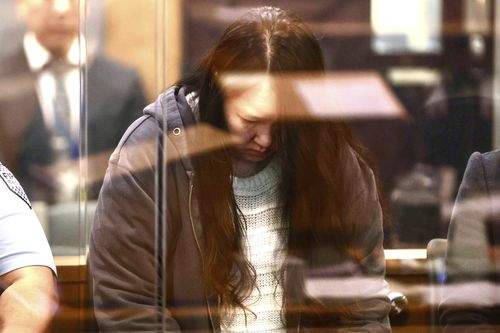Share this @internewscast.com
A mother who confessed to killing her children and placing them in suitcases before abandoning them in a South Auckland storage unit has been held accountable for their murders. A jury dismissed her plea of insanity.
For most of the trial, Hakyung Lee beamed into the courtroom from another.
Today, she appeared in court again, head bowed and hair obscuring her face, while the jury’s foreperson announced the verdict after just over three hours of deliberation.

Justice Geoffrey Venning convicted Lee and remanded her in custody until sentencing on November 26.
He asked for mental health reports to be prepared ahead of that hearing.
The remains of Minu Jo, aged 6, and his sister Yuna Jo, aged 8, were found in August 2022 by an unsuspecting couple who had won an auction for a storage unit in Papatoetoe.
Their mother, Lee, previously known as Ji Eun (Jasmine) Lee, confessed to administering the anti-depressant nortriptyline to her children before sealing their bodies in suitcases, leaving them in the storage facility, and flying to South Korea on a business class flight in 2018.
But she claimed she suffered a “descent into living hell” that began with her husband’s cancer diagnosis in 2017.
The defense argued that her precarious mental health led her to “descend into madness” and take her children’s lives, claiming she was not guilty due to insanity.
But the Crown argued at the time she killed her children, Lee knew the moral wrongfulness of her actions.
This morning, Venning summed up the case to the jury.
“This case comes down to one main issue… whether she murdered the children or whether she was insane in terms of the Crimes Act,” he said.
The Crown had to prove the charges of murder beyond reasonable doubt.
To establish a defense of insanity, the jury needed to be convinced that Lee was likely experiencing a major depressive episode that constituted a disease of the mind at the time of the killings, explained Venning.

The jury had to also be satisfied because of that disease of the mind she did not know the moral wrongfulness of her actions.
The jury heard closing arguments from both sides yesterday.
Crown Prosecutor Natalie Walker pointed out that psychiatrist Dr Erik Monasterio accepted that it was likely Lee had some form of depression and/or prolonged grief disorder at the time of the killings, but the Crown said it was not so severe as to constitute a disease of the mind.
The prosecutor argued Lee’s actions around the time were organised.
“However unthinkable her actions and killing her children were, you may think there was a cold calculation in them⦠showing ruthless rationality of action,” Walker said.
Monasterio had found that Lee did not have an insanity defence available to her.
Lee – who represented herself – was assisted throughout the trial by standby counsel of Lorraine Smith and Chris Wilkinson-Smith.
Smith said in closing that it was simply “mental illness” that led everyone to the High Court in Auckland.
“Jasmine Lee had her faith until she didn’t⦠she descended into madness⦠she thought killing her children was the right thing to do, so in a distorted, insane, fractured frame of mind she killed them,” he said.
Much of Smith’s closing argument focused on Lee’s fragility and how she’s always been fragile.
Smith said when she married her husband, she became dependent on him.
“Everything changed when he died and, over the next seven months, she lost contact and became isolated,” Smith said.
Smith invited the jury to return verdicts of not guilty by reason of insanity.
“She’s not a liar⦠she’s mentally unwell⦠she barely has the will to lift her head⦠this is not an act to make you to feel sorry for her,” Smith said, referring the jury to Hakyung Lee who has appeared throughout the trial via a video link from another courtroom with her head down.
Smith went on to refer to the evidence of psychiatrist Dr Yvette Kelly, who found that an insanity defence was available to Lee.
“She has come to this case simply at the request of the court⦠she did not expect to find insanity but when she dug deeper⦠found a principled basis on which she could find insanity.”
The prosecution’s final remarks to the jury were that it wasn’t up to them to work out why Lee killed her children, but whether they believed Lee was insane at the time.
“Perhaps the thought of a life parenting her children alone without her husband was too much for Ms Lee. She was dependent on him and already so socially isolated when he died,” Natalie Walker said.
She pointed out the steps Lee took from June 27 onwards and suggested they were consistent with Lee wanting a “new, easier life on her own and under a new name”.
“There is no evidence other than her own self-serving accounts.”
“The Crown suggested that when she gave her two young children nortriptyline, it was a selfish act to free herself from the burden of parenting alone⦠It was not the altruistic act of a mother who had lost her mind and believed it was the morally right thing to do⦠it was the opposite.
“Ms Lee deliberately, and in sound mind, deliberately murdered Minu and Yuna and the right verdict is guilty of murder,” Walker finished.











